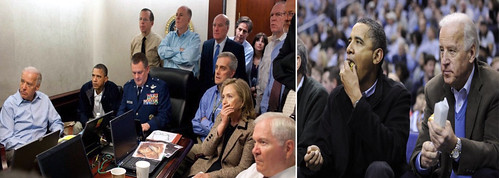 Where have all our freedoms gone? Have they eroded before our eyes because we failed to use them by demanding that our elected representatives protect the Constitution? Did irrational fear of an unseen enemy with no country, armed with a fanatical hatred scare us into allowing those freedoms to be abrogated? Apparently our current government from the executive to the judicial seem to think that the Constitution is a nice idea but its time has passed. We’re at war with “terror” and “terror” will never surrender. Law Professor Jonathan Turley, in an op-ed written shortly after President Obama signed the National Defense Authorization Act into law, enumerated the ten reasons the US is no loner the land of the free:
Where have all our freedoms gone? Have they eroded before our eyes because we failed to use them by demanding that our elected representatives protect the Constitution? Did irrational fear of an unseen enemy with no country, armed with a fanatical hatred scare us into allowing those freedoms to be abrogated? Apparently our current government from the executive to the judicial seem to think that the Constitution is a nice idea but its time has passed. We’re at war with “terror” and “terror” will never surrender. Law Professor Jonathan Turley, in an op-ed written shortly after President Obama signed the National Defense Authorization Act into law, enumerated the ten reasons the US is no loner the land of the free:
1. Assassination of U.S. citizens
Last year, President Obama went further than George W. Bush would have dared with the ordered assassination of a US citizen, Anwar al-Awlaqi. Just as the Bush administration justified torture, Pres. Obama justified targeted assassination of an American citizen without due process in a secret memo from administration lawyers. The administration cavalierly calling it “due process in war.” Yet, the US is hypocritical enough to criticize other countries for doing the same.
2. Indefinite detention
Under the NDAA the president can indefinitely detain a citizen that is suspected of terrorism and allow the military to hold them. While President Obama issued a signing statement saying that he would never do that, signing statement have no force of law and are not binding, either for Obama or any future president. Presidents have been known to change their minds, Obama does so on a regular basis.
3. Arbitrary justice
The president decides who will be tried in the Federal courts or by a military tribunal, a system, as Prof. Turley points out, “that has been ridiculed around the world for lacking basic due process protections.” Yet countries like China and Egypt have rejected tribunals as an alternative to civilian courts.
Those first three reasons totally disregard the Fifth, Sixth and Eighth Amendments
4. Warrantless searches
Under the Patriot Act of 2001, and reinforced by Pres. Obama in 2011, the government can force companies and businesses to turn over citizens records, everything from finances to library records without a warrant and bar the company from telling the targets.
Fourth Amendment? What Fourth Amendment?
5. Secret evidence
The government under the guise of national security says it doesn’t have to show evidence it deems secret for national security thus forcing the dismissal of lawsuits brought against it for illegal detention and torture. This is how the Obama Justice Department has protected the war criminals from the Bush administration not only from civil liability but criminal prosecution for crimes against humanity. As Prof Turley describes, “This allows the government to claim secret legal arguments to support secret proceedings using secret evidence.”
Star Chamber?
6. War Crimes
Since 2009, the President Obama has refused to allow the prosecution of anyone responsible for waterboarding and torture. This in complete disregard of treaty obligations and the Nuremberg principles of international law. The Obama administration went so far as to pressure countries such as Spain to drop criminal investigations of war crimes committed by the Bush administration. Yet the US continues to reserve the right to prosecute war criminals in other countries. ”
“Do as I say not as I do” is the attitude that has fed the hatred of terrorists, as well as, disdain from countries like China when we criticize their human rights violations.
7. Secret court
The Foreign Intelligence Surveillance Court is the United States’ “secret court”, the “star chamber“, that operates in total secrecy. Created in 1978, the eleven judges of the U.S. Foreign Intelligence Surveillance Court (FIS) consider and rule on applications by federal law enforcement and intelligence agencies to conduct electronic surveillance anywhere within the United States. When FISA came up for renewal under the Bush administration it expanded its secret warrants to include individuals deemed to be aiding or abetting hostile foreign governments or organizations. Then Sen. Barack Obama said that he would filibuster the renewal unless certain portions of the bill were fixed to ensure that it did not violate the Constitution. Needless to say, Sen Obama not only did not filibuster the FISA, he voted for it, promising to “fix it” if he was elected president. That was a lie. In 2011, not only did President Obama not fix it, he expanded it to in include secret searches of individuals who are not part of an identifiable terrorist group.
8. Immunity from judicial review
The Obama administration has pushed for, and granted, immunity of telecommunications companies that assist in warantless surveillance. Citizens who have had their privacy violated by the government no longer have redress.
9. Continual monitoring of citizens
So far the Obama administration has successfully defended in the courts its view that it has the right to use GPS to monitor every move of targeted citizens without securing any court order or review. The case, Jones v. United States, could overturn Katz v. United States which is celebrated as saving privacy in the United States, articulated the principle that “the Fourth Amendment protects people, not places.” That 1967 decision reversed a long erosion of privacy protection and required greater use of warrants by the government.
10. Extraordinary renditions
While the Obama administration has insisted that it no longer transfers persons into the custody of other countries where they could be held and tortured, it is still claiming the right to to order such transfers, including the possible transfer of U.S. citizens.
Prof. Turley goes in to quote those who are justifying these abuses as saying it’s all due to the times we in which we live. But as he so importantly notes in conclusion:
An authoritarian nation is defined not just by the use of authoritarian powers, but by the ability to use them. If a president can take away your freedom or your life on his own authority, all rights become little more than a discretionary grant subject to executive will.
The framers lived under autocratic rule and understood this danger better than we do. James Madison famously warned that we needed a system that did not depend on the good intentions or motivations of our rulers: “If men were angels, no government would be necessary.”
Benjamin Franklin was more direct. In 1787, a Mrs. Powel confronted Franklin after the signing of the Constitution and asked, “Well, Doctor, what have we got – a republic or a monarchy?” His response was a bit chilling: “A republic, Madam, if you can keep it.”
Since 9/11, we have created the very government the framers feared: a government with sweeping and largely unchecked powers resting on the hope that they will be used wisely. [..]
Dishonesty from politicians is nothing new for Americans. The real question is whether we are lying to ourselves when we call this country the land of the free.
What was that “change” that was promised three years ago?


 Where have all our freedoms gone? Have they eroded before our eyes because we failed to use them by demanding that our elected representatives protect the Constitution? Did irrational fear of an unseen enemy with no country, armed with a fanatical hatred scare us into allowing those freedoms to be abrogated? Apparently our current government from the executive to the judicial seem to think that the Constitution is a nice idea but its time has passed. We’re at war with “terror” and “terror” will never surrender. Law Professor Jonathan Turley, in an op-ed written shortly after President Obama signed the National Defense Authorization Act into law, enumerated the
Where have all our freedoms gone? Have they eroded before our eyes because we failed to use them by demanding that our elected representatives protect the Constitution? Did irrational fear of an unseen enemy with no country, armed with a fanatical hatred scare us into allowing those freedoms to be abrogated? Apparently our current government from the executive to the judicial seem to think that the Constitution is a nice idea but its time has passed. We’re at war with “terror” and “terror” will never surrender. Law Professor Jonathan Turley, in an op-ed written shortly after President Obama signed the National Defense Authorization Act into law, enumerated the  Twist as the president’s supporters might with the
Twist as the president’s supporters might with the
Recent Comments